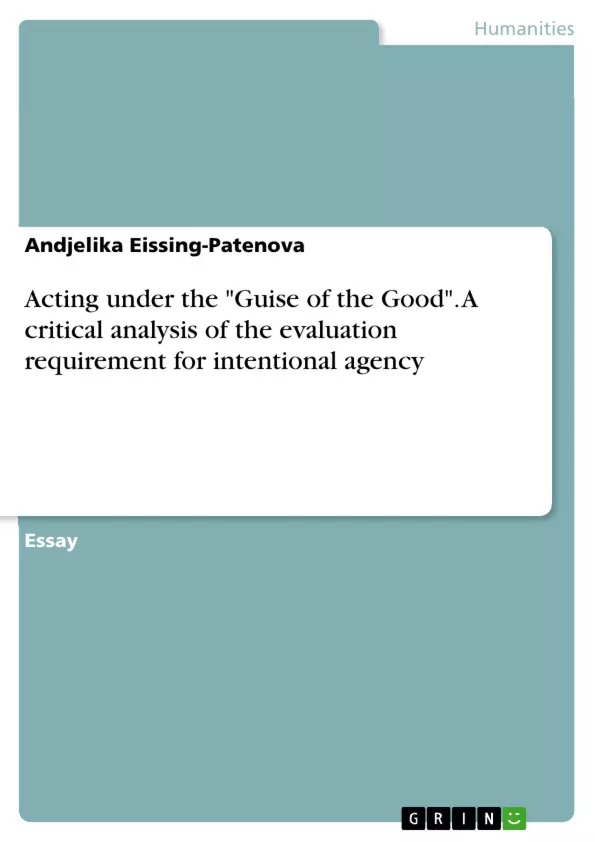Do we always perceive our actions as good? I defend the claim that an agent always perceives at least some good in his intentional action - often called the “guise of the good“ (GG) thesis. In the philosophical debate, this goodness requirement has often been rejected by pointing to its problematic consequences. However, the source of such objections lies in the ambiguity and the imprecise use of the term “good“. Thus, I will show how the presumed problems can be tackled. First, "intentional action" is specified and a distinction of two interpretations of the term “good“ is given, which are relevant not only for the purpose of this paper, but also for gaining a clear view on the debate about the goodness requirement for intentional agency in general. Then, my main argument is presented and justified in detail, explaining for which understanding of “good“ it is correct and for which it can obviously be deemed false. The main argument goes as follows: (P1): Intentional actions are actions done for motivating reasons by an agent A. (P2): If A has motivating reasons for his intentional action, he necessarily perceives at least some good in his action. (C): Therefore, A always perceives at least some good in his intentional action. This paper further includes a reconstruction of Kieran Setiya's objection to the GG thesis. Regarding his arguments, I will show in which way the problems highlighted can be handled by applying my argument. I conclude with a brief overview of the results, their practical implications and a demand for further interdisciplinary investigation, especially in psychology.
Inhaltsverzeichnis (Table of Contents)
- I. INTRODUCTION
- II. INTENTIONAL AGENCY
- III. HOW TO UNDERSTAND THE "GOOD"
- IV. MAIN ARGUMENT
- V. KIERAN SETIYA'S OBJECTION TO THE GG THESIS
- VI. CONCLUSION
Zielsetzung und Themenschwerpunkte (Objectives and Key Themes)
This paper examines the "guise of the good" (GG) thesis, arguing that an agent always perceives at least some good in their intentional actions. The author aims to clarify the ambiguities surrounding the term "good" and address objections to the GG thesis. This analysis explores the nature of intentional agency and the distinction between moral and non-moral good.
- Intentional agency and the role of reasons in action
- The "guise of the good" thesis and its implications for intentional action
- The distinction between moral and non-moral good
- The subjective nature of perceived good in intentional actions
- Addressing objections and providing a nuanced understanding of the GG thesis
Zusammenfassung der Kapitel (Chapter Summaries)
- I. INTRODUCTION: This introductory section introduces the GG thesis and its central claim that agents perceive some good in their intentional actions. It acknowledges objections to the thesis but suggests that the source of such objections lies in the ambiguous use of the term "good."
- II. INTENTIONAL AGENCY: This chapter defines intentional actions as actions performed for reasons, distinguishing them from mere movements or reflexes. It discusses the importance of reasons-explanation in making actions intelligible and provides examples to illustrate the concept.
- III. HOW TO UNDERSTAND THE "GOOD": This section distinguishes between two interpretations of "good" - moral good and non-moral good. The author explains that these distinct meanings have significant implications for understanding the GG thesis.
- IV. MAIN ARGUMENT: This chapter presents and justifies the main argument of the paper, focusing on the non-moral good. It argues that when an agent has motivating reasons for an action, they necessarily perceive those reasons as good, regardless of their moral implications.
- V. KIERAN SETIYA'S OBJECTION TO THE GG THESIS: This chapter analyzes a specific objection to the GG thesis, showing how the problems highlighted can be addressed by applying the author's argument about non-moral good.
Schlüsselwörter (Keywords)
The key concepts explored in this paper include intentional agency, the "guise of the good" thesis, moral good, non-moral good, subjective perception, motivating reasons, and action explanation. These terms are central to understanding the nuances of the GG thesis and its implications for the nature of human agency.
Frequently Asked Questions
What is the "guise of the good" (GG) thesis?
The GG thesis is the philosophical claim that whenever an agent acts intentionally, they must perceive their action as having at least some good or value.
What is the difference between moral and non-moral good in this context?
Moral good refers to ethical rightness, while non-moral good refers to subjective reasons or benefits the agent perceives in the action, even if the action is morally wrong.
How does the paper define "intentional action"?
Intentional actions are defined as actions performed for motivating reasons by an agent, distinguishing them from mere reflexes or accidental movements.
What is Kieran Setiya’s objection to the GG thesis?
Setiya argues that agents can act intentionally without necessarily seeing any good in their action. The paper aims to reconstruct and address this objection by clarifying the term "good."
Why is the term "good" considered ambiguous in the debate?
The term is often used imprecisely, leading to confusion between what is objectively good and what is subjectively perceived as a reason for acting.
- Citation du texte
- Andjelika Eissing-Patenova (Auteur), 2019, Acting under the "Guise of the Good". A critical analysis of the evaluation requirement for intentional agency, Munich, GRIN Verlag, https://www.grin.com/document/459487



